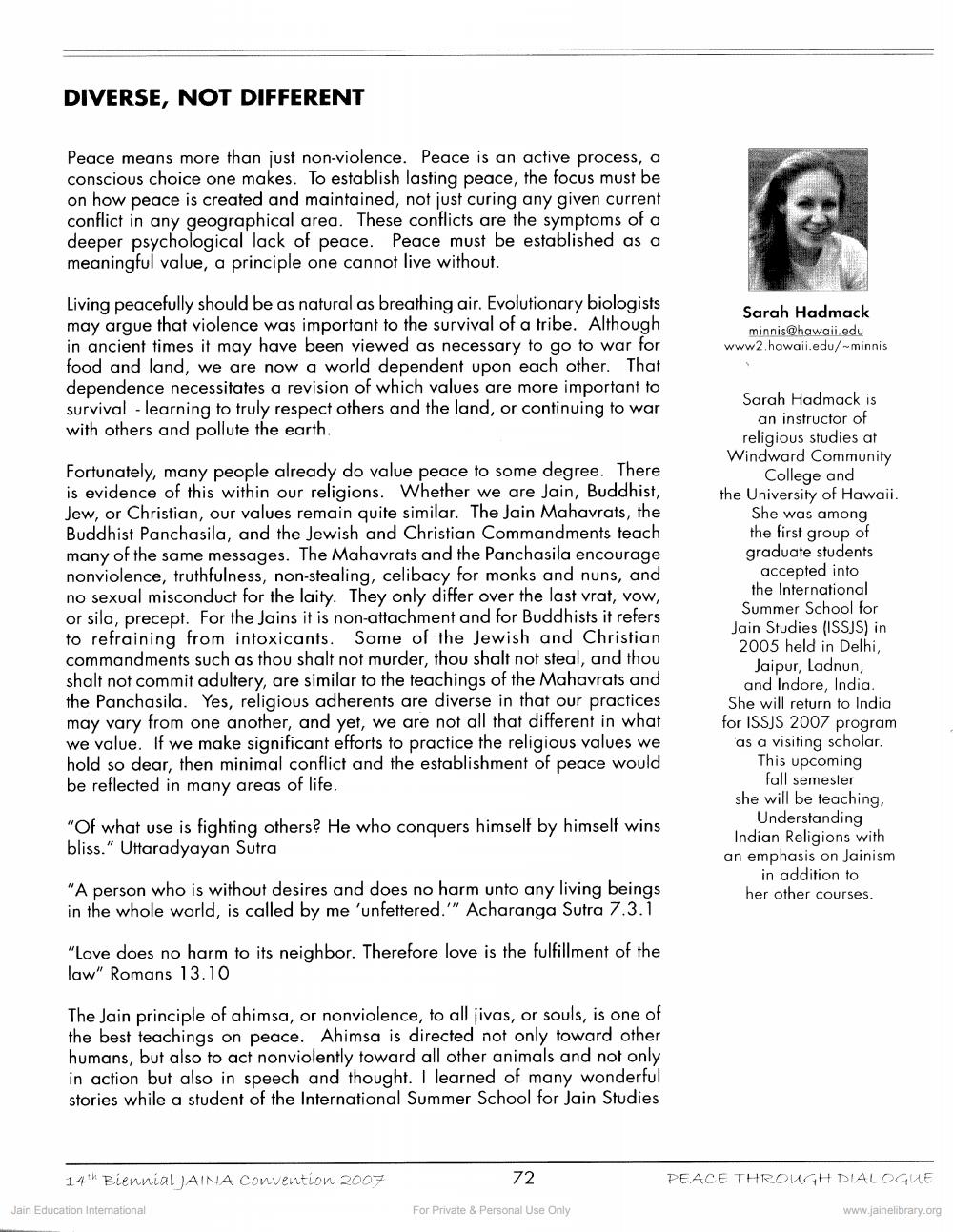________________
DIVERSE, NOT DIFFERENT
Peace means more than just non-violence. Peace is an active process, a conscious choice one makes. To establish lasting peace, the focus must be on how peace is created and maintained, not just curing any given current conflict in any geographical area. These conflicts are the symptoms of a deeper psychological lack of peace. Peace must be established as a meaningful value, a principle one cannot live without.
Sarah Hadmack
[email protected] www2.hawaii.edu/-minnis
Living peacefully should be as natural as breathing air. Evolutionary biologists may argue that violence was important to the survival of a tribe. Although in ancient times it may have been viewed as necessary to go to war for food and land, we are now a world dependent upon each other. That dependence necessitates a revision of which values are more important to survival - learning to truly respect others and the land, or continuing to war with others and pollute the earth.
Fortunately, many people already do value peace to some degree. There is evidence of this within our religions. Whether we are Jain, Buddhist, Jew, or Christian, our values remain quite similar. The Jain Mahavrats, the Buddhist Panchasila, and the Jewish and Christian Commandments teach many of the same messages. The Mahavrats and the Panchasila encourage nonviolence, truthfulness, non-stealing, celibacy for monks and nuns, and no sexual misconduct for the laity. They only differ over the last vrat, vow, or sila, precept. For the Jains it is non-attachment and for Buddhists it refers to refraining from intoxicants. Some of the Jewish and Christian commandments such as thou shalt not murder, thou shalt not steal, and thou shalt not commit adultery, are similar to the teachings of the Mahavrats and the Panchasila. Yes, religious adherents are diverse in that our practices may vary from one another, and yet, we are not all that different in what we value. If we make significant efforts to practice the religious values we hold so dear, then minimal conflict and the establishment of peace would be reflected in many areas of life.
Sarah Hadmack is
an instructor of religious studies at Windward Community
College and the University of Hawaii.
She was among the first group of graduate students
accepted into the International Summer School for Jain Studies (ISSJS) in 2005 held in Delhi,
Jaipur, Ladnun, and Indore, India. She will return to India for ISSJS 2007 program as a visiting scholar.
This upcoming
fall semester she will be teaching,
Understanding Indian Religions with an emphasis on Jainism
in addition to her other courses.
"Of what use is fighting others? He who conquers himself by himself wins bliss." Uttaradyayan Sutra
"A person who is without desires and does no harm unto any living beings in the whole world, is called by me 'unfettered." Acharanga Sutra 7.3.1
"Love does no harm to its neighbor. Therefore love is the fulfillment of the law" Romans 13.10
The Jain principle of ahimsa, or nonviolence, to all jivas, or souls, is one of the best teachings on peace. Ahimsa is directed not only toward other humans, but also to act nonviolently toward all other animals and not only in action but also in speech and thought. I learned of many wonderful stories while a student of the International Summer School for Jain Studies
14th Biennial ) AINA Convention 2007
72
PEACE THROUGH DIALOGUE
Jain Education Intemational
For Private & Personal Use Only
www.jainelibrary.org
